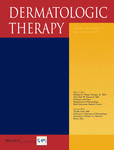Importance of concomitant topical therapy in moderate-to-severe atopic dermatitis treated with cyclosporine
ABSTRACT
Cyclosporine (CS) is widely used in patients with refractory atopic dermatitis (AD). During CS treatment, many patients have a tendency to decrease their adherence to topical agents as their disease improves. Our aim was to compare the efficacy and relapse rate of CS treatment combined with topical therapy and CS monotherapy. This prospective, randomized, 6 month study involved 60 patients with moderate-to-severe AD who were randomly assigned to two groups, one receiving CS and topical agents and the other, CS only. Clinical outcomes were based on investigators’ global assessment (IGA) scores, eczema areas and severity index scores, and trans-epidermal water loss. If a patient achieved treatment success (IGA score ≤2) during the study period, CS was stopped. Relapse rate and time to relapse were evaluated during the 3 months after discontinuation of CS. The treatment success rate was significantly higher in the combination group (p = 0.028). The combination group had a shorter median time to response (p = 0.040), a lower cumulative dose (p = 0.041), and a longer time to relapse (p < 0.01) than the monotherapy group. Although CS monotherapy is effective against AD, topical agents should be used concomitantly.




